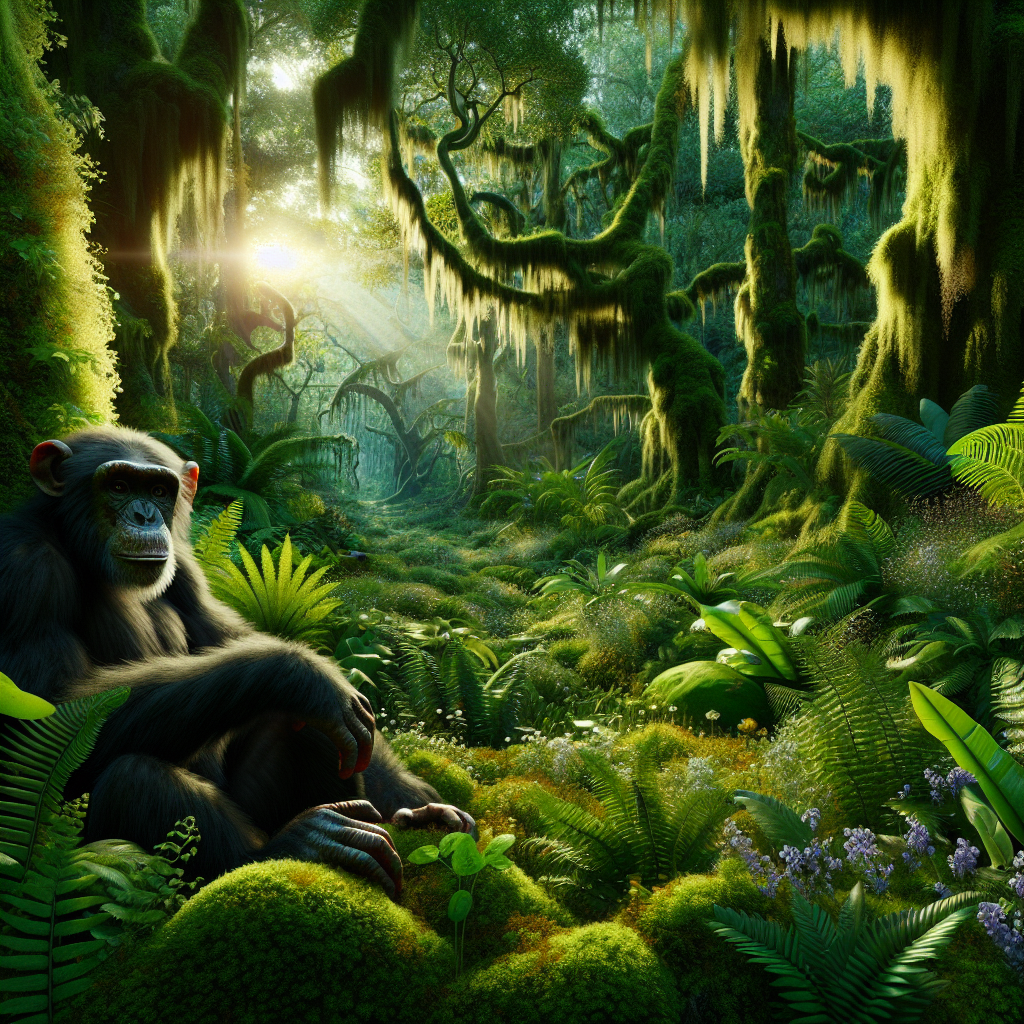Scientists in Uganda found that wild chimpanzees eat special plants to help them feel better when they are sick or hurt. They watched the chimpanzees and collected the plants they ate. Most of these plants can kill bacteria. The scientists think that learning from chimpanzees might help us find new medicines.
Dr. Elodie Freymann from the University of Oxford led the study. She and her team watched two groups of chimpanzees for four years. They looked at the chimpanzees’ droppings and urine to see if they were sick. They noticed that sick or hurt chimpanzees ate certain plants, so they collected and tested these plants.
Dr. Freymann said they can’t be sure if the plants made the chimpanzees better, but the study shows we can learn a lot from animals. She also said it’s important to protect these forests. The scientists hope their work will help find new medicines from these plants.
Original news source: Chimpanzees ‘self-medicate’ with healing plants (BBC)
🎧 Listen:
Slow
Normal
Fast
📖 Vocabulary:
| 1 | chimpanzees | A type of large monkey that lives in Africa |
| 2 | bacteria | Tiny living things that can make you sick |
| 3 | medicines | Things you take to feel better when you are sick |
| 4 | scientists | People who study science |
| 5 | collected | Gathered things together |
| 6 | droppings | Animal poop |
| 7 | urine | Liquid waste from the body |
| 8 | protect | Keep safe from harm |
| 9 | forests | Large areas with many trees |
| 10 | study | Research or investigation |
| 11 | tested | Checked to see if something works |
| 12 | important | Something that matters a lot |
Group or Classroom Activities
Warm-up Activities:
– Charades
Instructions: Divide the class into small groups. Give each group a list of vocabulary words related to the article. One person from each group will act out a word from the list without speaking, while the others in the group try to guess what the word is. The group that guesses the most words correctly wins.
– News Summary
Instructions: Have the students work individually or in pairs to write a summary of the article using their own words. Encourage them to include the main ideas and key details. After they have finished, have them share their summaries with the class.
– Opinion Poll
Instructions: Divide the class into pairs. Have each pair discuss and share their opinions on the following question: “Do you think it’s possible to find new medicines by studying animals like chimpanzees?” After they have discussed, have them survey other pairs in the class to gather different opinions. Finally, have a class discussion to share and compare the different viewpoints.
– Vocabulary Pictionary
Instructions: Write a list of vocabulary words from the article on the board. Divide the class into small groups. One person from each group will choose a word from the list and draw a picture to represent that word. The other members of the group will try to guess what word it is based on the drawing. The group that guesses the most words correctly wins.
– Future Predictions
Instructions: Have the students work individually or in pairs to write a short paragraph predicting what they think might happen in the future as a result of the study mentioned in the article. Encourage them to use their imagination and think creatively. After they have finished, have them share their predictions with the class.
🤔 Comprehension Questions:
1. What did the scientists in Uganda find about wild chimpanzees?
2. What did the scientists collect from the chimpanzees?
3. Why do the scientists think learning from chimpanzees is important?
4. Who led the study?
5. How did the scientists know if the chimpanzees were sick?
6. What did the sick or hurt chimpanzees eat?
7. Why is it important to protect the forests where the chimpanzees live?
Go to answers ⇩
🎧✍️ Listen and Fill in the Gaps:
Scientists in (1)______ found that wild chimpanzees eat (2)______ plants to help them feel better when they are sick or (3)______. They watched the chimpanzees and collected the plants they ate. Most of these plants can kill bacteria. The scientists think that learning from chimpanzees might help us find new medicines.
Dr. Elodie (4)______ from the University of Oxford led the study. She and her team (5)______ two (6)______ of chimpanzees for four years. They looked at the chimpanzees’ droppings and (7)______ to see if they were (8)______. They noticed that sick or hurt chimpanzees ate (9)______ plants, so they collected and tested these plants.
Dr. Freymann said they can’t be sure if the plants (10)______ the chimpanzees better, but the study shows we can learn a lot from animals. She also said it’s important to protect these forests. The scientists (11)______ their (12)______ will help find new medicines from these plants.
Go to answers ⇩
💬 Discussion Questions:
Students can ask a partner these questions, or discuss them as a group.
1. What did scientists in Uganda find out about wild chimpanzees?
2. How did the scientists collect the plants that the chimpanzees ate?
3. What do the scientists think we can learn from chimpanzees?
4. Who led the study mentioned in the article?
5. How long did the scientists watch the chimpanzees for?
6. What did the scientists look at to see if the chimpanzees were sick?
7. What did the scientists notice about sick or hurt chimpanzees?
8. What did the scientists do with the plants they collected?
9. Can the scientists be sure if the plants made the chimpanzees better?
10. Why did Dr. Freymann say it’s important to protect these forests?
11. What do the scientists hope their work will help find?
12. Why is it important to learn from animals, according to Dr. Freymann?
Individual Activities
📖💭 Vocabulary Meanings:
Match each word to its meaning.
Words:
1. chimpanzees
2. bacteria
3. medicines
4. scientists
5. collected
6. droppings
7. urine
8. protect
9. forests
10. study
11. tested
12. important
Meanings:
(A) Liquid waste from the body
(B) Large areas with many trees
(C) Checked to see if something works
(D) Gathered things together
(E) Tiny living things that can make you sick
(F) Animal poop
(G) A type of large monkey that lives in Africa
(H) People who study science
(I) Research or investigation
(J) Things you take to feel better when you are sick
(K) Something that matters a lot
(L) Keep safe from harm
Go to answers ⇩
🔡 Multiple Choice Questions:
1. What did scientists in Uganda find out about wild chimpanzees?
(a) They eat special plants for fun.
(b) They eat special plants to make them stronger.
(c) They don’t eat any plants when they are sick or hurt.
(d) They eat special plants when they are sick or hurt.
2. Why did the scientists collect the plants that the chimpanzees ate?
(a) Because they wanted to see if the plants were poisonous.
(b) Because they thought the plants could kill bacteria.
(c) Because they wanted to see if the plants tasted good.
(d) Because they wanted to see if the plants made the chimpanzees sick.
3. How long did the scientists watch the chimpanzees for?
(a) Four years.
(b) One year.
(c) Two years.
(d) Six months.
4. What did the scientists look at to see if the chimpanzees were sick?
(a) Their fur.
(b) Their teeth.
(c) Their droppings and urine.
(d) Their eyes.
5. What did the scientists notice about sick or hurt chimpanzees?
(a) They didn’t eat any plants.
(b) They ate certain plants.
(c) They only ate meat.
(d) They only ate fruits.
6. What did Dr. Freymann say about the plants and the chimpanzees?
(a) She was sure the plants made the chimpanzees better.
(b) She didn’t think the plants made any difference to the chimpanzees.
(c) She couldn’t be sure if the plants made the chimpanzees better.
(d) She thought the plants made the chimpanzees worse.
7. What did Dr. Freymann say is important to do?
(a) Protect the forests.
(b) Cut down the forests.
(c) Build more houses in the forests.
(d) Hunt the chimpanzees.
8. What do the scientists hope their work will help find?
(a) New animals.
(b) New food.
(c) New toys.
(d) New medicines.
Go to answers ⇩
🕵️ True or False Questions:
1. The scientists believe that studying the chimpanzees’ behavior could help us find new medicines.
2. Dr. Elodie Freymann from the University of Cambridge led the study on the chimpanzees.
3. These plants that the chimpanzees eat can actually promote bacterial growth.
4. The researchers observed two groups of chimpanzees for four years.
5. While it’s certain that the plants made the chimpanzees feel worse, the study shows that we cannot learn anything from animals.
6. The sick or injured chimpanzees were seen eating specific plants, which the scientists collected and tested.
7. The scientists examined the chimpanzees’ droppings and urine to see if they were sick.
8. Scientists in Uganda discovered that domestic chimpanzees eat regular plants when they are sick or injured.
Go to answers ⇩
📝 Write a Summary:
Write a summary of this news article in two sentences.
Check your writing now with the best free AI for English writing!
Writing Questions:
Answer the following questions. Write as much as you can for each answer.
Check your answers with our free English writing assistant!
1. What did scientists in Uganda find out about wild chimpanzees?
2. How did the scientists collect the plants that the chimpanzees ate?
3. What did the scientists do with the plants they collected?
4. What did Dr. Elodie Freymann say about the plants and the chimpanzees?
5. What do the scientists hope to find from these plants?
✅ Answers
🤔✅ Comprehension Question Answers:
1. What did the scientists in Uganda find about wild chimpanzees?
The scientists found that wild chimpanzees eat special plants when they are sick or hurt.
2. What did the scientists collect from the chimpanzees?
The scientists collected the plants that the chimpanzees ate.
3. Why do the scientists think learning from chimpanzees is important?
The scientists think learning from chimpanzees is important because it might help us find new medicines.
4. Who led the study?
Dr. Elodie Freymann from the University of Oxford led the study.
5. How did the scientists know if the chimpanzees were sick?
The scientists looked at the chimpanzees’ droppings and urine to see if they were sick.
6. What did the sick or hurt chimpanzees eat?
The sick or hurt chimpanzees ate certain plants.
7. Why is it important to protect the forests where the chimpanzees live?
It is important to protect the forests where the chimpanzees live because they provide a home for the chimpanzees and the plants they eat, which could help us find new medicines.
Go back to questions ⇧
🎧✍️✅ Listen and Fill in the Gaps Answers:
(1) Uganda
(2) special
(3) hurt
(4) Freymann
(5) watched
(6) groups
(7) urine
(8) sick
(9) certain
(10) made
(11) hope
(12) work
Go back to questions ⇧
📖💭✅ Vocabulary Meanings Answers:
1. chimpanzees
Answer: (G) A type of large monkey that lives in Africa
2. bacteria
Answer: (E) Tiny living things that can make you sick
3. medicines
Answer: (J) Things you take to feel better when you are sick
4. scientists
Answer: (H) People who study science
5. collected
Answer: (D) Gathered things together
6. droppings
Answer: (F) Animal poop
7. urine
Answer: (A) Liquid waste from the body
8. protect
Answer: (L) Keep safe from harm
9. forests
Answer: (B) Large areas with many trees
10. study
Answer: (I) Research or investigation
11. tested
Answer: (C) Checked to see if something works
12. important
Answer: (K) Something that matters a lot
Go back to questions ⇧
🔡✅ Multiple Choice Answers:
1. What did scientists in Uganda find out about wild chimpanzees?
Answer: (d) They eat special plants when they are sick or hurt.
2. Why did the scientists collect the plants that the chimpanzees ate?
Answer: (b) Because they thought the plants could kill bacteria.
3. How long did the scientists watch the chimpanzees for?
Answer: (a) Four years.
4. What did the scientists look at to see if the chimpanzees were sick?
Answer: (c) Their droppings and urine.
5. What did the scientists notice about sick or hurt chimpanzees?
Answer: (b) They ate certain plants.
6. What did Dr. Freymann say about the plants and the chimpanzees?
Answer: (c) She couldn’t be sure if the plants made the chimpanzees better.
7. What did Dr. Freymann say is important to do?
Answer: (a) Protect the forests.
8. What do the scientists hope their work will help find?
Answer: (d) New medicines.
Go back to questions ⇧
🕵️✅ True or False Answers:
1. The scientists believe that studying the chimpanzees’ behavior could help us find new medicines. (Answer: True)
2. Dr. Elodie Freymann from the University of Cambridge led the study on the chimpanzees. (Answer: False)
3. These plants that the chimpanzees eat can actually promote bacterial growth. (Answer: False)
4. The researchers observed two groups of chimpanzees for four years. (Answer: True)
5. While it’s certain that the plants made the chimpanzees feel worse, the study shows that we cannot learn anything from animals. (Answer: False)
6. The sick or injured chimpanzees were seen eating specific plants, which the scientists collected and tested. (Answer: True)
7. The scientists examined the chimpanzees’ droppings and urine to see if they were sick. (Answer: True)
8. Scientists in Uganda discovered that domestic chimpanzees eat regular plants when they are sick or injured. (Answer: False)
Go back to questions ⇧















